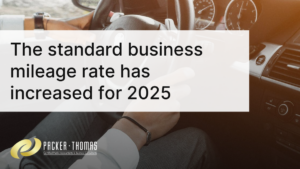The use of a company vehicle is a valuable fringe benefit for owners and employees of small businesses. This benefit results in tax deductions for the employer as well as tax breaks for the owners and employees using the cars. (And of course, they get the nontax benefits of driving the cars!) Even better, recent tax law changes and IRS rules make the perk more valuable than before.
Here’s an example
Let’s say you’re the owner-employee of a corporation that’s going to provide you with a company car. You need the car to visit customers, meet with vendors and check on suppliers. You expect to drive the car 8,500 miles a year for business. You also expect to use the car for about 7,000 miles of personal driving, including commuting, running errands and weekend trips with your family. Therefore, your usage of the vehicle will be approximately 55% for business and 45% for personal purposes. You want a nice car to reflect positively on your business, so the corporation buys a new luxury $50,000 sedan.
Your cost for personal use of the vehicle will be equal to the tax you pay on the fringe benefit value of your 45% personal mileage. By contrast, if you bought the car yourself to be able to drive the personal miles, you’d be out-of-pocket for the entire purchase cost of the car.
Your personal use will be treated as fringe benefit income. For tax purposes, your corporation will treat the car much the same way it would any other business asset, subject to depreciation deduction restrictions if the auto is purchased. Out-of-pocket expenses related to the car (including insurance, gas, oil and maintenance) are deductible, including the portion that relates to your personal use. If the corporation finances the car, the interest it pays on the loan would be deductible as a business expense (unless the business is subject to business-interest limitation under the tax code).
In contrast, if you bought the auto yourself, you wouldn’t be entitled to any deductions. Your outlays for the business-related portion of your driving would be unreimbursed employee business expenses that are nondeductible from 2018 to 2025 due to the suspension of miscellaneous itemized deductions under the Tax Cuts and Jobs Act. And if you financed the car yourself, the interest payments would be nondeductible.
And finally, the purchase of the car by your corporation will have no effect on your credit rating.
Administrative tasks
Providing an auto for an owner’s or key employee’s business and personal use comes with complications and paperwork. Personal use will have to be tracked and valued under the fringe benefit tax rules and treated as compensation. This article only explains the basics.
Despite the necessary valuation and paperwork, a company-provided car is still a valuable fringe benefit for business owners and key employees. It can provide them with the use of a vehicle at a low tax cost while generating tax deductions for their businesses. We can help you stay in compliance with the rules and explain more about this prized perk.
© 2019







